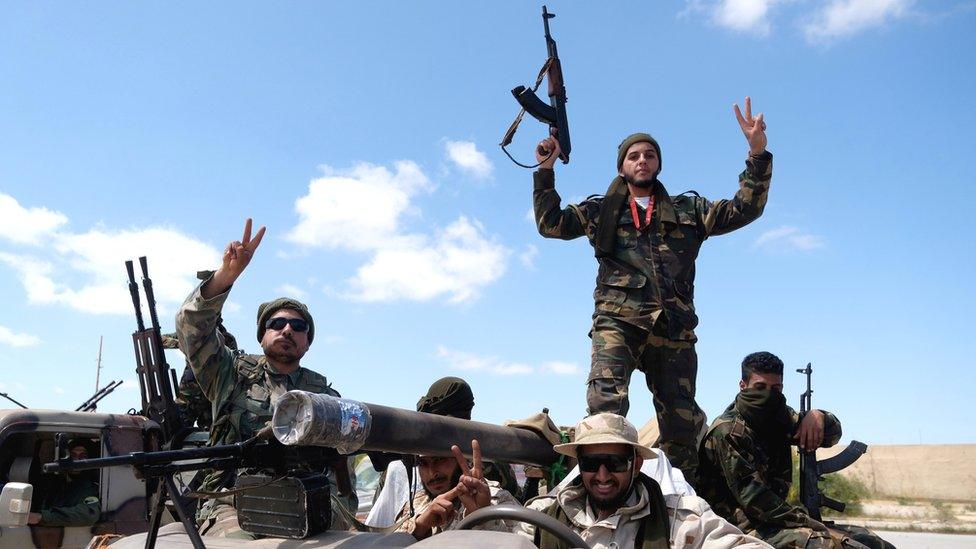Libya floods: Entire neighbourhoods dragged into the sea
- Published
Watch: Floods tear through Libyan city of Derna
Rescue teams in Libya are struggling to retrieve the bodies of victims that have been swept out to sea in tsunami-like flood waters.
At least 2,300 have been killed, according to the ambulance authority in Derna, the worst affected city.
Two dams and four bridges collapsed in Derna, submerging much of the city after Storm Daniel hit on Sunday.
About 10,000 people are reported missing, the Red Crescent says, and the death toll is expected to rise further.
Some aid has started to arrive, including from Egypt, but rescue efforts have been hampered by the political situation in Libya, with the country split between two rival governments.
The US, Germany, Iran, Italy, Qatar and Turkey are among the countries that have said they have sent or are ready to send aid.
Video footage recorded after dark on Sunday shows a river of floodwater churning through the city with cars bobbing helplessly in the current.
There are harrowing stories of people being swept out to sea, while others clung onto rooftops to survive.
"I was shocked by what I saw, it's like a tsunami," Hisham Chkiouat, from Libya's eastern-based government, said.
He told BBC Newshour that the collapse of one of the dams to the south of Derna had dragged large parts of the city into the sea.
"A massive neighbourhood has been destroyed - there is a large number of victims, which is increasing each hour."
Your device may not support this visualisation
Kasim Al-Qatani, an aid worker in the town of Bayda, told the BBC's Newsnight programme it was difficult for rescuers to reach Derna as most of the main paths into the city were "out of service because of huge damage".
An investigation has been launched into why the floods were able to cause such devastation, he said, adding that 2.5bn Libyan Dinar (£412m; $515m) would be given to help rebuild Derna and the eastern city of Benghazi.
The cities of Soussa, Al-Marj and Misrata were also affected by Sunday's storm.
Water engineering experts told the BBC it is likely the upper dam, around 12km (eight miles) from the city, had failed first, sending its water sweeping down the river valley towards the second dam, which lies closer to Derna - where neighbourhoods were inundated.
"At first we just thought it was heavy rain but at midnight we heard a huge explosion and it was the dam bursting," Raja Sassi, who survived along with his wife and small daughter, told Reuters news agency.
Libyan journalist Noura Eljerbi, who is based in Tunisia told the BBC she only found out that around 35 of her relatives who all lived in the same apartment block in Derna were still alive after contacting a local rescue team.
"The house has been destroyed but my family managed to get out before things got worse. They are safe now," she said.
Mr Qatani said there was no clean drinking water in Derna, and a lack of medical supplies.
He added that the only hospital in Derna could no longer take patients because "there are more than 700 dead bodies waiting in the hospital and it's not that big".
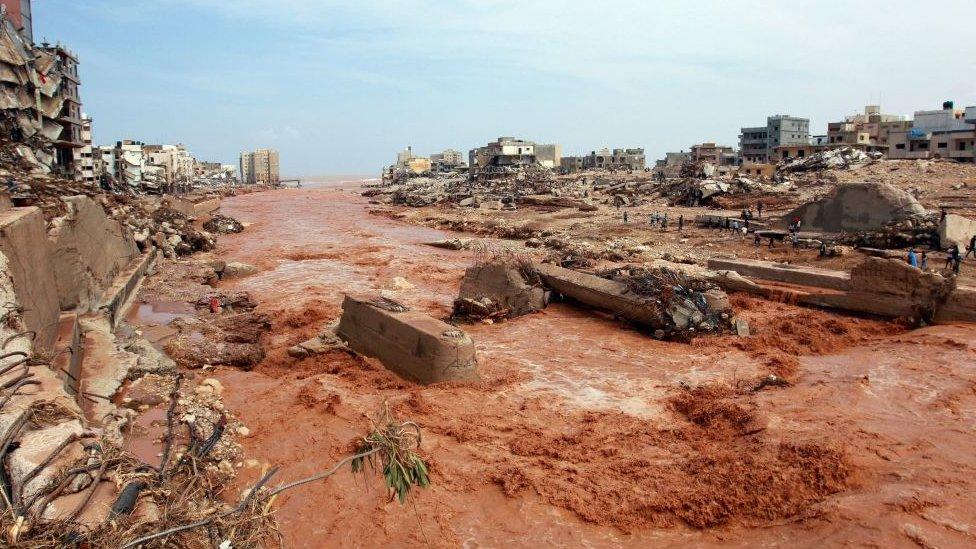
The low-lying areas of Derna near the sea have been worst affected
Libya has been in political chaos since long-serving ruler Col Muammar Gaddafi was overthrown and killed in 2011 - leaving the oil-rich nation effectively split with an interim, internationally recognised government operating from the capital, Tripoli, and another one in the east.
Libyan journalist Abdulkader Assad said the confusion around this was hampering rescue efforts.
"You have people who are pledging help but the help is not coming," he told the BBC. "There are no rescue teams, there are no trained rescuers in Libya. Everything over the last 12 years was about war."
But despite the split, the government in Tripoli has sent a plane with 14 tonnes of medical supplies, body bags and more than 80 doctors and paramedics.
Brian Lander, the deputy director of emergencies at the UN's World Food Programme, said the organisation had food supplies for 5,000 families.
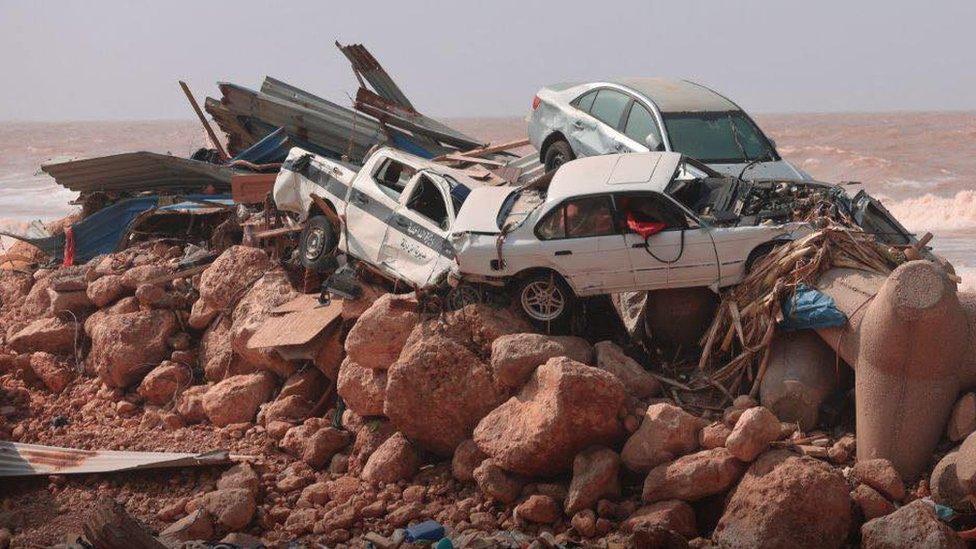
Whole neighbourhoods in Derna were washed out to sea
Derna, about 250km east of Benghazi along the coast, is surrounded by the nearby hills of the fertile Jabal Akhdar region.
The city was once where militants from the Islamic State group built a presence in Libya, after Gaddafi's fall. They were driven out some years later by the Libyan National Army (LNA), forces loyal to Gen Khalifa Haftar who is allied to the eastern administration.
The powerful general said eastern officials are currently assessing damage caused by the floods so roads can be reconstructed and electricity restored to help rescue efforts.
Libya's leading Al-Wasat news website has suggested that failures to properly rebuild and maintain infrastructure in Derna after years of conflict is partly to blame for the high death toll.
"The security chaos and Libyan authorities' laxity in carrying out close monitoring of safety measures [of the dams] led to the catastrophe," it quoted economic expert Mohammed Ahmed as saying.



Are you in Derna, Libya? Are you affected by the flooding? Get in touch by emailing haveyoursay@bbc.co.uk, external.
Please include a contact number if you are willing to speak to a BBC journalist. You can also get in touch in the following ways:
WhatsApp: +44 7756 165803
Tweet: @BBC_HaveYourSay, external
Please read our terms & conditions and privacy policy
If you are reading this page and can't see the form you will need to visit the mobile version of the BBC website to submit your question or comment or you can email us at HaveYourSay@bbc.co.uk, external. Please include your name, age and location with any submission.
Related topics
- Published30 March 2021
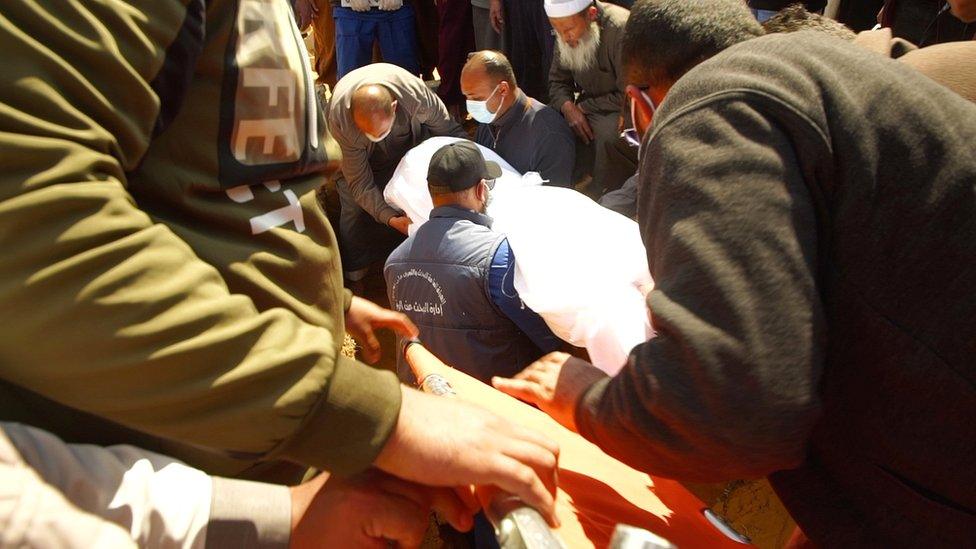
- Published13 September 2023
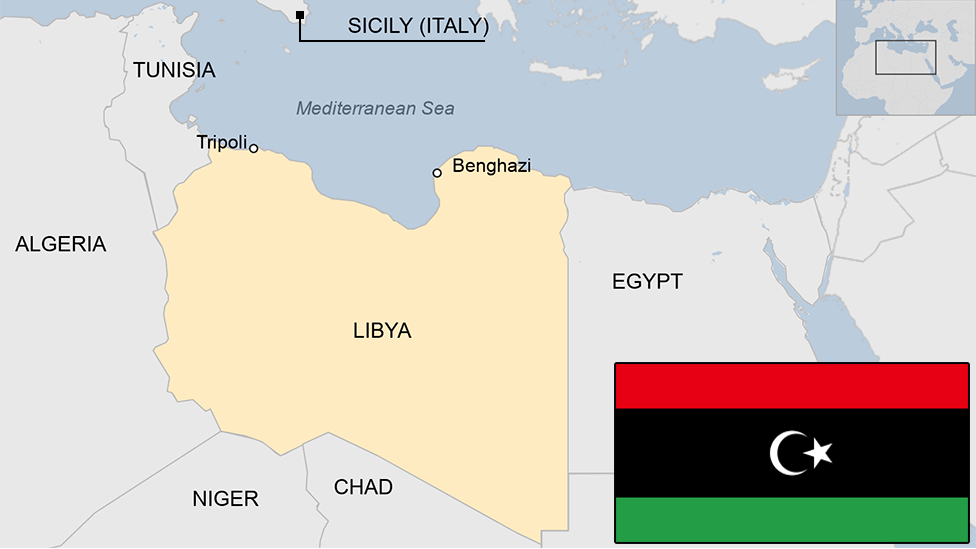
- Published23 January 2020
